
The Dioscorides Garden in Athens
Located on the iconic grounds of Zappeion, the Dioscorides Garden showcases plants significant to ancient Greek medicine and history as documented by Pedanius Dioscorides (40-90 CE) in his influential medical text, De Materia Medica.
The Story of the Garden
Dioscorides was a Greek medical botanist whose text, De Materia Medica (Greek: Περὶ ὕλης ἰατρικῆς), described approximately 600 plants for more than 1,000 traditional medicines. His textbook was hand-copied and extensively referenced by physicians and herbalists for 1,500 years. Centuries after it was written, this celebrated herbal reference would become the basis of European and Western pharmacopoeia.
The Dioscorides Garden in Athens is inspired by the Dioscorides Garden at the U.S. National Arboretum in Washington, DC. Botanical gardens all over the world help to celebrate the medicinal plants that have played important roles throughout history in treating a variety of ailments and diseases. Many of these plants remain key plants in herbal medicine practices and scientific research continues to affirm many of their ancient uses for modern therapies.
The Dioscorides Garden is managed by the Herbalists Without Borders, Athens Chapter. Herbalists Without Borders is a non-profit organization that focuses on herbal education and holistic healthcare led by chapters worldwide.
Explore the Garden
The Dioscorides Garden in Athens is located in Zappeion, a historical park in the center of Athens featuring a palatial building built in the late 1800s for the first Olympics in Athens, as well as Roman archaeological remains from approximately the 3rd century CE. Today, the area is popular to both residents and tourists for a variety of leisure and educational activities.
The garden is located in a public area accessible year-round. Learn about the plants in the garden or visit the garden any time of the year.
-

Basil (Ocimum basilicum)
Άγιος βασιλικός
Sweet basil is an aromatic herb commonly found on balconies and in gardens throughout Greece. The Latin name Basilicum originates from the Greek word for king, basileus. The herb supports digestion and prevents stomach cramps. Dioscorides wrote that the "juice takes away dimness in the eyes, and dries up excess fluids in them. Taken in a drink the seed is good for those who breed depression, for frequent painful urination, and flatulence" (De Materia Medica, 2-171). The herb has been used as a medicinal plant for the treatment of headaches, coughs, diarrhea, constipation, warts, worms, and kidney malfunctions.
-
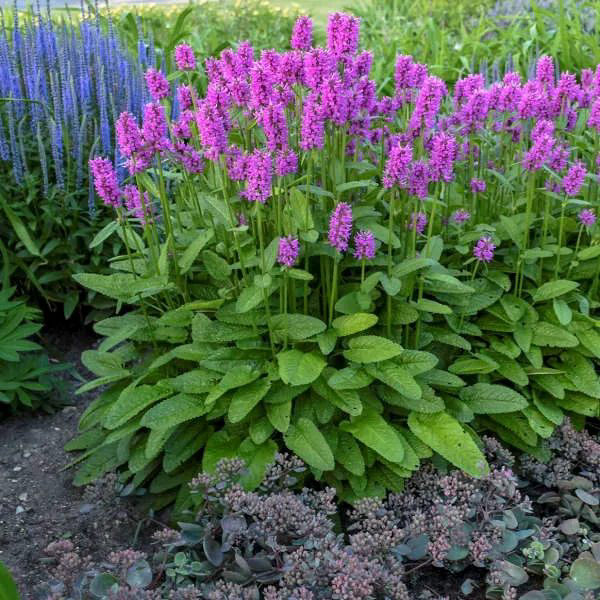
Betony (Stachys officinalis)
Βετονίκη
The genus name Stachys comes from Greek meaning "an ear of grain" referring to the spike inflorescence that looks like an ear of corn or grain. The ancient Greeks praised its healing powers while also using it for protection against evil. Dioscorides used betony for tuberculosis, as an antidote against poisons, and for womb health (4-1). He also infused the herb in wine for seven months to make a medicinal wine with the same benefits (5-54). The herb is used in herbal medicine as a panacea and tonic to improve any condition caused by general weakness.
-
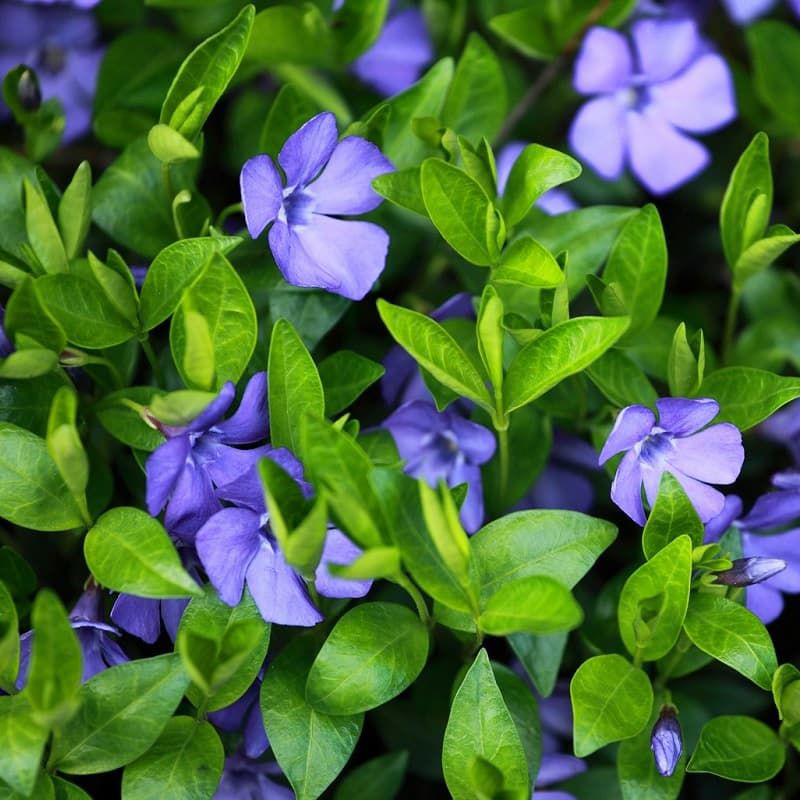
Common periwinkle (Vinca minor)
Βίγκα έρπουσα μικρόφυλλη
In antiquity, periwinkle was used to treat digestive ailments, ease toothaches, and as a topical poultice for bites from venomous snakes (4-7). Modern research suggests that the plant may be helpful to treat dementia and improve brain health, as it enhances the ability of the brain to utilize oxygen and glucose.
-
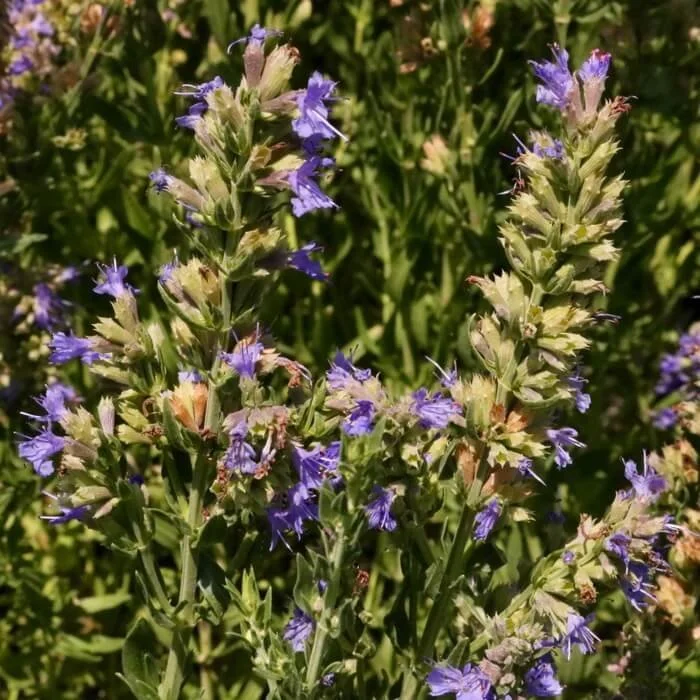
Hyssop (Hyssopus officinalis)
Ύσσωπος
According to Dioscorides, hyssop boiled with figs, rue, and honey was used to treat pneumonia, asthma, and coughs (3-30). In traditional medicines, hyssop is used as an expectorant to reduce and expel fluids from the lungs. It also stimulates digestion and helps boost nutrition absorption. It is an aromatic plant that attracts bees and is delightful in gardens.
-
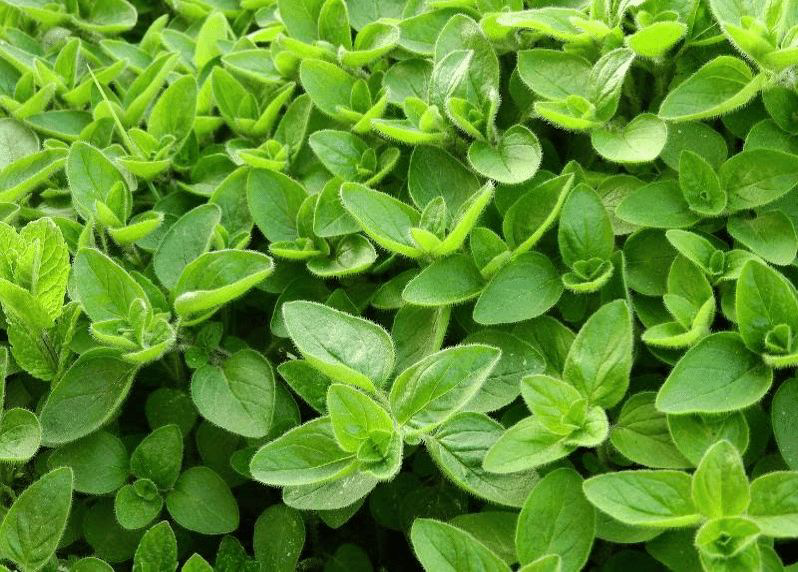
Marjoram (Origanum majorana)
Μαντζουράνα
In antiquity, marjoram was plaited into wreaths and worn on the head. To treat bruises, Dioscorides recommened applying a mix of dried leaves with honey (3-47). It was also used for inflammation, fatigue, and chills. In herbal practices, marjoram helps with reducing inflammation, relieving digestive issues, and regulating the menstrual cycle. Marjoram is rich in magnesium and potassium, and supports heart health.
-
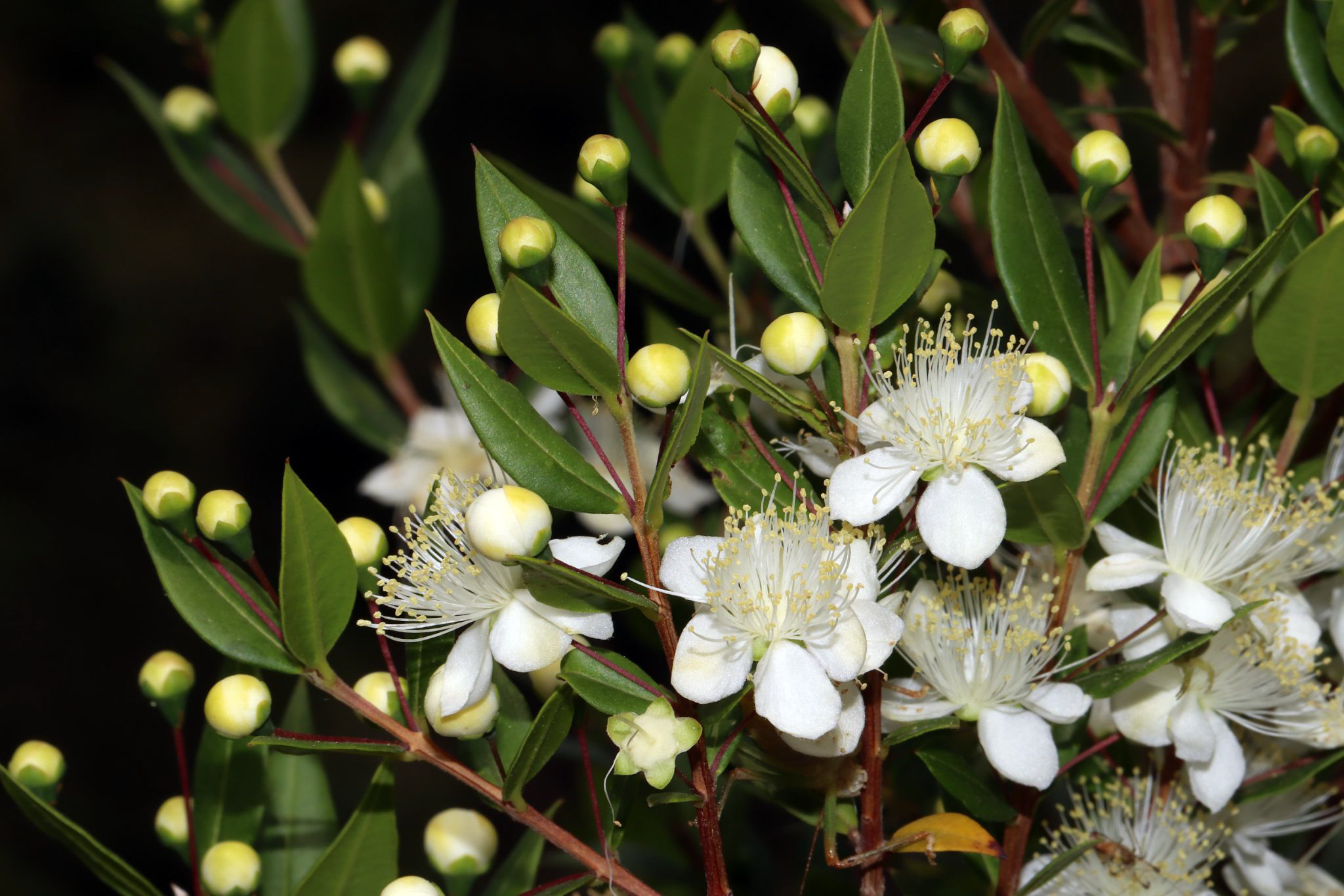
Myrtle (Myrtus communis)
Μυρτιά
As the sacred plant of Aphrodite, goddess of love and beauty, this evergreen shrub has been immortalized as a symbol of Aphrodite's feminine energy. In antiquity, it was woven into crowns worn at weddings and banquets. As medicine, Dioscorides wrote that the plant helped heal fractures, relieve rashes, and prevent hair from falling out (1-155). Myrtle wine made from the berries was used to dye hair.
-

Lavender (Lavandula stoechas)
Λεβάντα
Lavender is a delightfully aromatic herb that can uplift the emotions, relieve headache and anxiety, and support easeful sleep. Dioscorides recommended it for "disorders in the chest" and "mixed with antidotes" (3-31). It was also made into a wine to relieve bloating, nerve pain, and cold constitutions (5-52). Studies suggest it may help relieve stress, chronic pain, high blood pressure, and asthma. A bouquet of dried lavender on the bedside or a sachet in the pillow can help improve sleep and fill the room with its lovely aroma.
-

Lemon Balm (Melissa officinalis)
Βάλσαμο λεμονιού
“Bees delight in the herb,” according to Dioscorides (3-118), which is why its genus is Melissa (μέλισσα), the ancient and modern Greek word for honeybee. Lemon balm is a medicinal and culinary herb native to the Mediterranean region and popular in Western herbal medicine. It has been used for topical wounds, burns, and stings for thousands of years, and supports the respiratory and digestive systems. In modern herbal medicine, the herb is considered an uplifting herb that can relieve anxiety and insomnia.
-

Oregano (Origanum vulgare)
Ρίγανη
The botanical name Origanum is derived from two Greek words meaning "delight of the mountain" or “mountain of happiness." The plant symbolizes good luck and health. Dioscorides wrote that the leaves and flowers taken in a drink with wine could help those bitten by snakes (3-34). Oregano is high in antioxidants and omega-3 fatty acids that help boost the immune response, fight off infections, support heart health, and help maintain healthy cholesterol levels. The herb is also high in minerals the stimulate the liver’s ability to detox and strengthen bone health, and has been used for coughs, wound healing, and parasite infections.
-
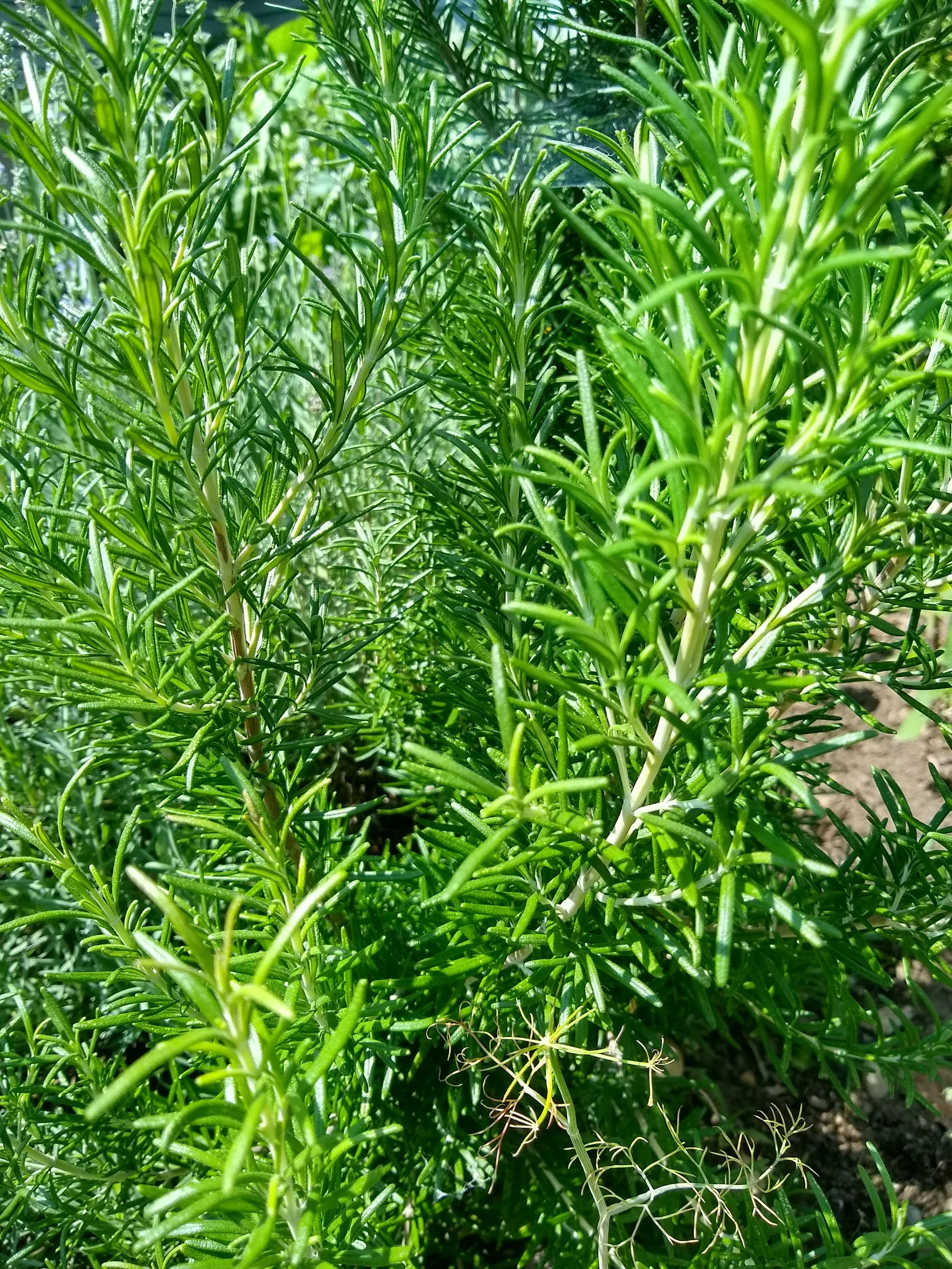
Rosemary (Rosmarinus officinalis / Salvia rosmarinus)
Δενδρολίβανο
Rosemary means "dew of the sea" in Latin and is an emblem of remembrance. In antiquity, rosemary was woven into wreaths worn on the head during wedding ceremonies. Dioscorides used this aromatic herb to cure jaundice and fatigue, and recommended the tea before exercise (3-89). This aromatic herb is used to improve memory and focus, reduce nervous tension, relieve fatigue, support digestion, and uplift the spirit. It stimulates blood flow throughout the body to improve circulation, and its volatile oils are antiseptic, antibacterial, and antifungal, making rosemary an important ally for fighting infection.
-
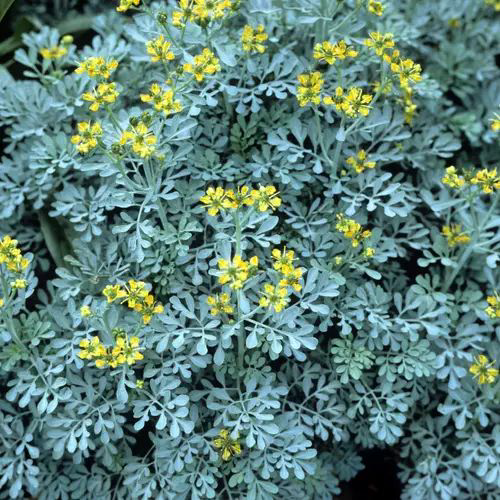
Rue (Ruta graveolens)
Θρηνώ / Απήγανος
Called an herb of grace, rue is used in herbal medicine for menstrual cramps, digestive ailments, arthritis, and weak eye sight. In large doses, rue can be poisonous. Dioscorides used this medicinal plant to reduce coughs, expel intestinal worms, relieve joint pain, and decrease inflammation, among many other uses (3-52). Since antiquity, it has been revered for both its spiritual and physical actions.
-
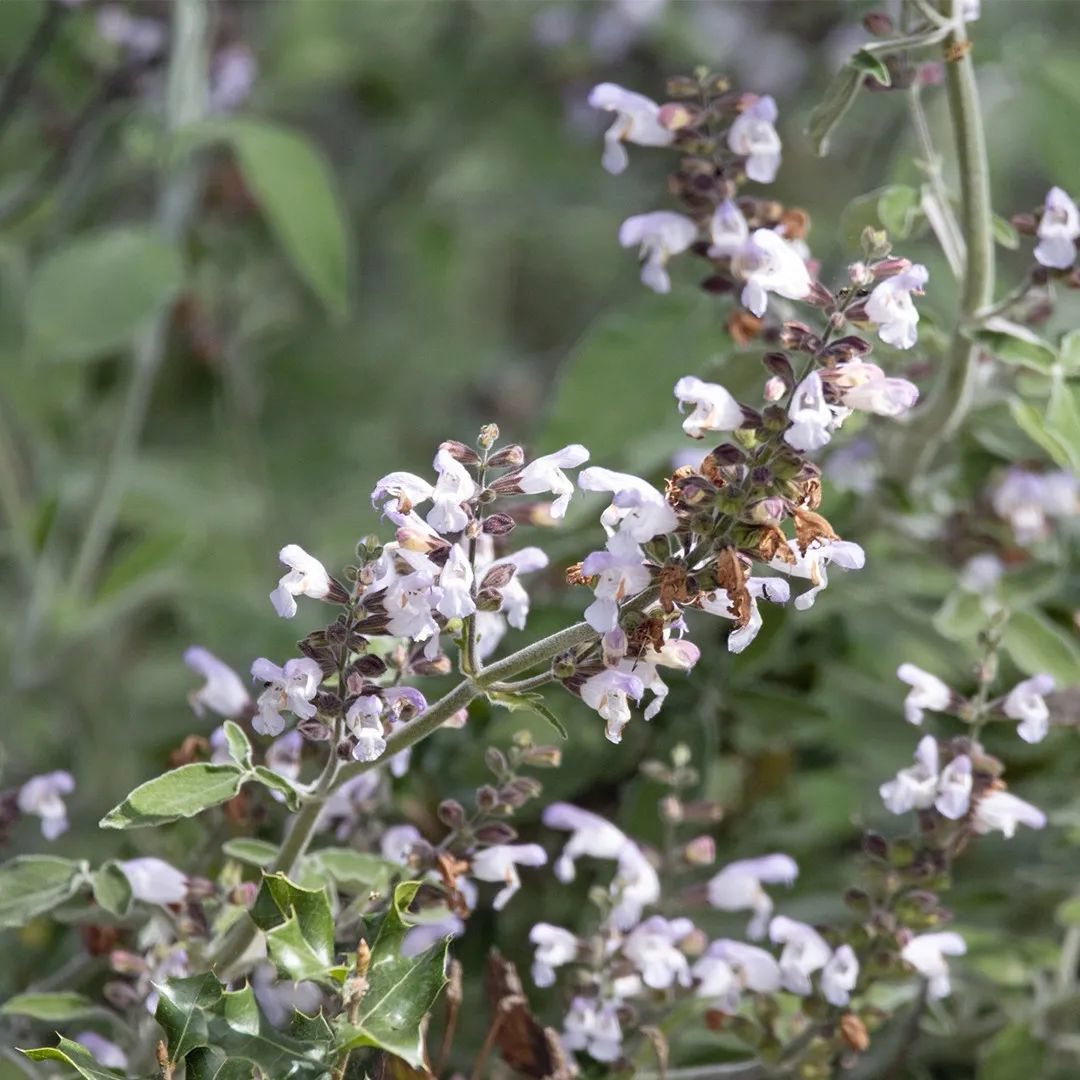
Sage (Salvia fruticosa)
Έλληνας φασκόμηλος
The ancient Greeks, Egyptians, and Romans believed that sage embodied divine elements and protected against evil. It was considered a sacred herb associated with the god Zeus, who ruled over mortals and immortals alike. The plant, a favorite of Dioscorides, was a symbol of good health and fertility. The Latin botanical name Salvia is derived from the Latin word salvare, meaning “to heal.” A superstition that persisted well into the Middle Ages said that a person would have a long life as long as sage grew in their garden.
-

Southernwood (Artemisia abrotanum)
Κοινή αψιθιά / Αρτεμισία αψίνθιο
The genus Artemisia is named after the Greek goddess Artemis, who ruled over wild animals, hunting, and the moon. The species arbotanum (αβρός / avrós) may refer to a slim or delicate person for whom this herb is indicated. In antiquity, the herb was used to treat respiratory difficulties, painful urination, and eye problems, and was an antidote for deadly poisons mixed with wine (3-29). Southernwood has antimicrobial, antioxidant, anticancer, and antiallergic properties that can be especially helpful for weak respiratory states and the prevention of diseases caused by insects. Traditionally, it is also used to improve liver function and stimulate menstruation.
-

Spearmint (Mentha viridis)
Μέντα
"A well-known little herb" according to Dioscorides (3-41) that had a variety of medicinal applications, including soothing hiccups, easing headaches, killing roundworms, and as an aphrodisiac. This sweet-smelling mint is a delightful herb to include in beverages, culinary dishes, and desserts. In herbal medicine, it is used to relieve indigestion and nausea, soothe sore throats, improve sleep, and relieve chest congestion. It also has implications for improving cognitive health and reducing stress.
-
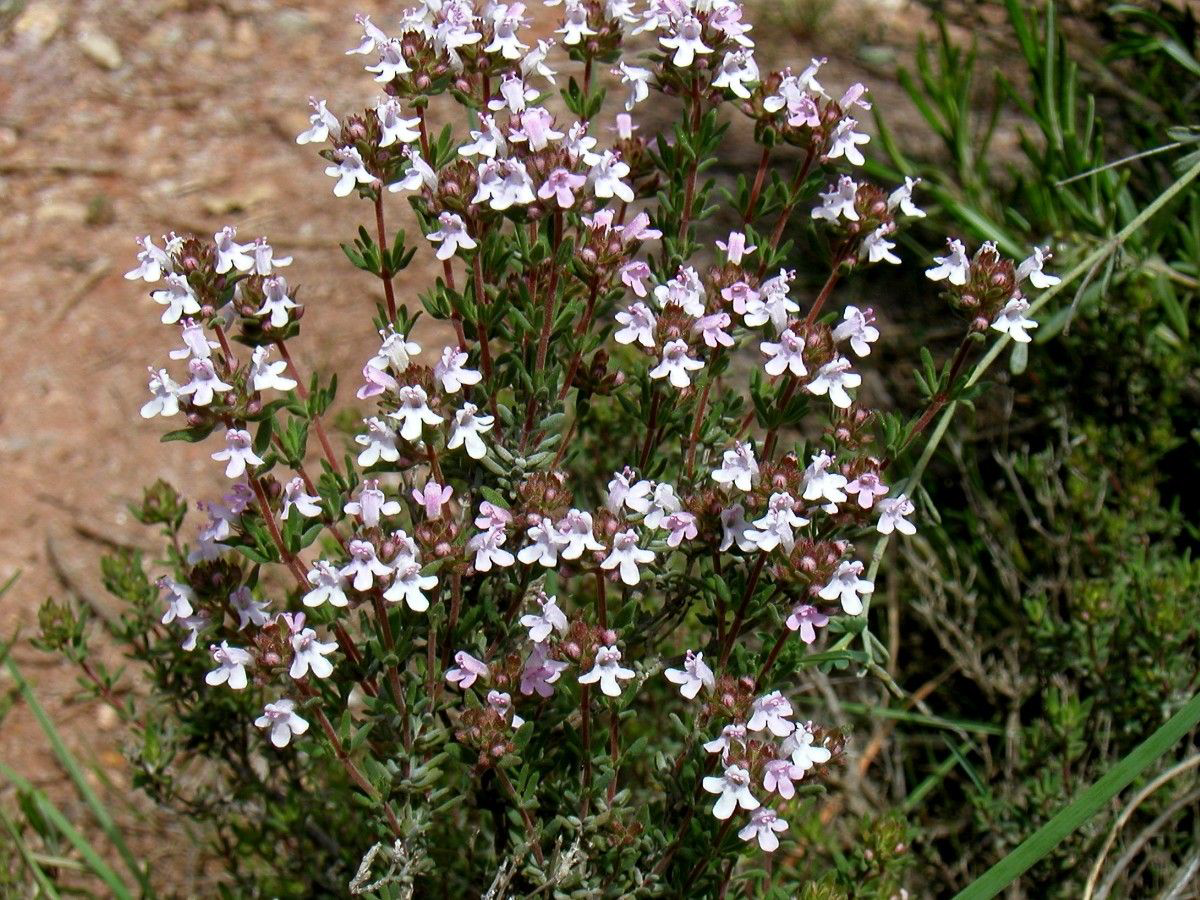
Thyme (Thymus vulgare)
Θυμάρι
"Everyone knows thyme" (3-44), according to Dioscorides, who used the herb for digestive difficulties, lack of appetite, disorders of the nerves, and as an antidote to poisons (5-59). The ancient Greeks drank thyme tea to maintain intestinal health and stimulate the menstrual flow. It was also used topically to reduce swelling and relieve pain. Today, thyme is considered a supreme respiratory remedy and is helpful for irritable stomachs and nervous conditions.
-
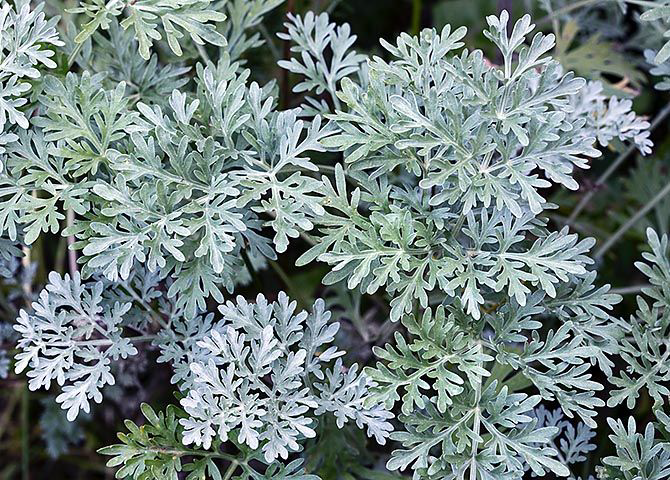
Wormwood (Artemisia absinthium)
Κοινή αψιθιά / Αρτεμισία αψίνθιο
Wormwood is in the same genus as southernwood. It is best known as the main ingredient in the alcoholic beverage absinthe, which has a long history of controversy. Dioscorides (3-26) describes its many medicinal uses for intestinal pain, lack of appetite, jaundice, eye health, as an antidote to poisons, and as an insect repellent. The herb is known for its bitterness, and in many herbal traditions it is used for digestion, intestinal worms, liver conditions, and melancholy.
-

Yarrow (Achillea millefolium)
Μυριόφυλλο / Αχιλλέα
The namesake of yarrow is the great Trojan War hero Achilles, who was reputed to have used the herb to staunch the wounds of his fellow warriors. According to Dioscorides, the herb "is excellent for an excessive discharge of blood" and for "old and new ulcers" (4-103). In herbal medicine, yarrow continues to be used as a vulnerary for external wounds as well as to strengthen permeability in the digestive tract.
Become a Supporter
Thank you for your support.
Consider becoming a garden supporter with a financial donation of any size. Funds raised will help support the garden’s ongoing maintenance and educational programs.
The Herbalists Without Borders, Athens Chapter is managed by Maria Christodoulou, The Greek Herbalist. Donations are processed by Herbalists Without Borders U.S. headquarters and are tax-deductible for U.S. residents.
SUPPORTers & SPONSORS
Additional Thank You
The groundskeepers at Zappeion; Chrissy Moore (Horticulturist, U.S. National Arboretum); Kathy Vidovich (Horticulturist, Cornell Botanic Gardens); Helen Watkins (Botanica School of Herbal Medicine, UK); and Alain Touwaide & Emanuela Appetiti (Institute for the Preservation of Medical Traditions).





